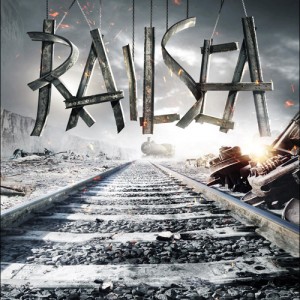The Occupy 2012 Road Trip has come to France via high-speed rail. You can get from London to Paris in two and a half hours now. Well, you can get from Calais to Paris pretty fast, and the Brits don’t delay you that much. Why is this impossible in the US, I thought? Why did the Republicans manage to delete all the high-speed rail from the stimulus and why did the Democrats let them get away with it? The train was packed, as was the link to Strasbourg, also high speed, which gets you from Paris to 30 kilometres from the German border in two hours.
Like most people I know, I really like trains. I was sitting there looking out of the window, ready to give Europe a boost, when I saw something that I don’t think I’ve seen in Western Europe before: a full-blown shanty-town. If you live in, or have traveled to, a developing country you’ll know what I mean. Informal housing, not officially connected to services, constructed out of sheets of corrugated aluminum (aluminium UK readers). The settlement was on the steep slope of a railway siding, so most of the structures must get soaked whenever it rains or snows by the runoff. And it was snowing. After London, it didn’t feel that cold out, but not so that you would want to sleep in one of those places.
As I was taking this in, I looked down at the journal I was reading, a very interesting collection of essays on race, colonialism and debt in the current American Quarterly (mostly paywalled but with a useful online resources section here) {PS American Quarterly, check out Strike Debt!!} Many of the essays show how the foreclosure disaster was particularly visited on African-American and Latina/o households, who were targeted for sub-prime high interest rate mortgages.
From there I went to thinking about China Miéville’s recent wonderful oddity Railsea [spoiler alert!!] The novel at first seems to be a reworking of Moby-Dick set on an alternative Earth where humans ride everywhere on railways–the rails, as they call them–and Captains of special trains pursue particular monstrous animals, known as their Philosophy. But we hit an alternative loop and go in search of the end of the Railsea. Without giving away too much, it turns out that the whole reason this railway world exists, with all its poisonous soil, abandoned materials from another world, mutant creatures and other foibles, was to pay off debt.
When I got off the rails, I was at once impressed by the apparent comfort and prosperity of Strasbourg, home to the European parliament, a body that is routinely steam-rollered by the Troika but apparently makes a nice living at it. I mentioned this to my anarcho-communist hosts. Oh no, they said. The city just puts all the “dangerous people” (their ironic quotes, meaning migrants, the dispossessed and so on) outside the centre of the city.

